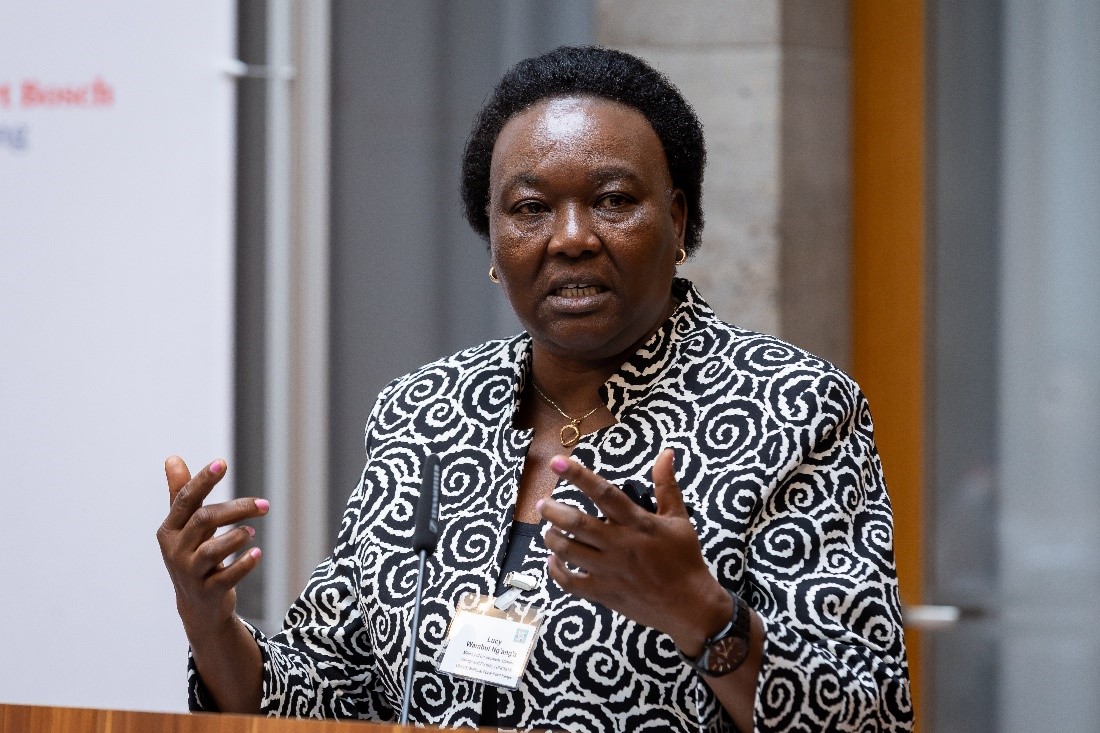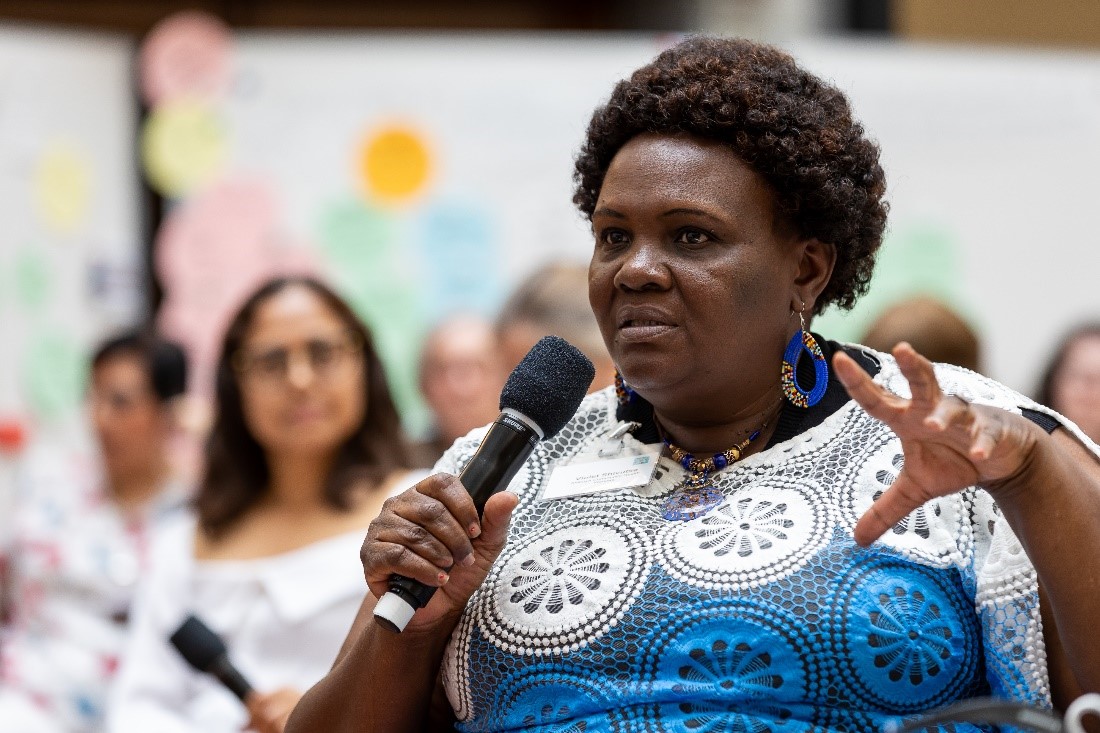Harnessing Synergies and Mobilizing Joint Action: A Historic First Workshop on Women’s Land Rights with all Three Rio Conventions
Reducing systemic inequalities, mitigating and adapting to climate change, and conserving biodiversity through nature conservation, sustainable land management and restoration
by Emily Robertson, Moritz Hauer, Frederike Klümper | 2023-07-13

“Land is at the interface and at the center of all three Rio Conventions. It must be managed sustainably if we want to mitigate and adapt to climate change, halt the loss of biodiversity, and achieve land degradation neutrality.” -Sebastian Lesch, Federal Ministry for Economic Cooperation and Development (BMZ) UNCCD National Focal Point Germany
In collaboration with the Robert Bosch Stiftung and the United Nations Convention to Combat Desertification (UNCCD), TMG Research gGmbH brought together around 60 stakeholders from more than 30 countries to the first ever workshop on women’s land rights with all three Rio Conventions. The workshop included key actors that are working to implement women’s land rights including National Focal Points, Convention secretariats and other UN bodies, and civil society organizations. From July 3-5, 2023 in Berlin, participants worked to address the question: How can we leverage synergies and develop concrete actions to advance women's land rights across the UN's Rio Conventions?
A Space for Collaboration
To truly foster collaboration, the workshop participants came together in carefully designed breakout groups. The groups served as dedicated spaces where vital discussions on women's land rights and the land rights agenda within and across the Rio Conventions could thrive. Each breakout group approached specific themes, such as establishing enabling environments for women's land rights at the local level, fostering alignment and coordination among National Focal Points across the three Conventions, advocating for coordinated efforts, ensuring meaningful participation of legitimate tenure right holders, and exploring transformative funding approaches. Through these purposeful and collaborative discussions, participants actively contributed to identifying pathways to empowering women's land rights while actively reflecting on the workshop's central goal of creating a space for fruitful collaboration.

Enabling environments for women’s land rights at the local level
Greater financial, technical, and legal empowerment of women, girls, and grassroot organizations is fundamental to ensuring women’s land rights. Additionally, men, boys, and traditional leaders must be engaged to sensitize them about the importance and benefits of women’s land rights. The participants also recommended for women’s land rights to be addressed in an interrelated manner, relevant issues such as access to education or sexual and gender-based violence need to be on the agenda as well. Multi-stakeholder dialogues among civil society organizations (CSOs), grassroots organizations, women leaders, and governmental officials can facilitate a safe and inclusive discussion on women´s land rights. Coalitions of CSOs at multiple levels play an important role in advancing such dialogues across the global and local level in a coordinated and inclusive manner.
“The benefits arising from gender equality in the control and access to land often extend well beyond the individual to greater security and stability for rural communities.” -Andrea Meza, Deputy Executive Secretary, UNCCD

Alignment and coordination of National Focal Points in the three Conventions
All too often, there is a lack of effective communication between the National Focal Points (NFPs), and active collaboration is complicated by institutional and organizational coordination challenges. As such, the participants strongly advocated the need for mapping existing NFPs and their structure across countries and the Conventions. This can help to bridge the current communication gap between NFPs. The participants suggested utilizing the review of the National Biodiversity Strategies and Action Plans (NBSAPs) to enhance NFP coordination and cooperation. Events such as the COP and the Africa Climate Summit are immediate windows of opportunities for strengthening relationships between NFPs in the near future.
“As National Focal Points of the Conventions of Climate Change, Biodiversity and Desertification we have the responsibility to strengthen our synergies. We can raise national awareness and coordination to achieve more impact in securing women’s land rights.” -Lucy Wambui Ng’ang’a, Ministry of Environment, Climate Change and Forestry, UNCBD & UNCCD National Focal Point Kenya.

Coordinated Advocacy
Coordinating and aligning our advocacy on women's land rights will build a cohesive narrative to effectively raise awareness, build political will, and empower women to exercise their land rights. Coordinated advocacy requires the mapping of partners and opportunities, creating a joint platform for knowledge sharing, and ensuring the participation of grassroots groups and local communities. The participants suggested establishing a community of practice at the nexus of women’s land rights and the Rio Conventions that is open to all and focused on global advocacy (e.g. developing key messages, creating a common glossary, collecting data, cases and stories from stakeholders, identifying relevant spaces and times to distribute messages, etc.). Existing advocacy campaigns and initiatives such as the Stand for Her Land Campaign and UNCCD's #HerLand on how to collect and distribute key messages, amplify women's voices, and share successful examples. The participants cautioned, however, that any advocacy efforts must take into account the realities of land ownership and carefully consider global and local historical, political, social and economic power imbalances.
“Securing women’s land rights is critical to enable a just transition towards improved livelihoods and climate-resilient land use. We bring key stakeholders together to explore coordinated action on gender equality and land rights.” -Ottilie Balz, Senior Vice President, Global Issues, Robert Bosch Stiftung
Meaningful Participation of Legitimate Tenure Right Holders
Meaningful participation requires a deeper understanding of existing power dynamics, establishing effective dispute resolution mechanisms, and building capacities to recognize, protect, safeguard, and record the rights of legitimate tenure right holders. Participants advocated for longer time frames for project outcomes, reducing the vulnerability of small-scale farmers, and promoting formal land recognition and safeguarding. They emphasized that meaningful participation goes hand in hand with understanding the perspectives of traditional, religious, and community groups, as well as local government and CSOs. By utilizing data collected directly from legitimate tenure right holders, decision making processes can become more inclusive, as this ensures that local realities are at the forefront. Existing tools, such as participatory land use mapping, can help to meaningfully engage legitimate tenure right holders. Overall, the participants highlighted the need for transparent, participatory, and inclusive approaches that empower legitimate tenure right holders, particularly women, in decision-making on land-related projects.
“Gender equality and women’s empowerment in rural communities depends on promoting women’s access to land and productive resources. We must place grassroots women at the forefront of advancing their land rights”. -Violet Shivutse, Shibuye Community Health Workers, Kenya.

Transformative Funding Approaches
Besides the overall limited accessibility of funding, there is a considerable lack of funding commitments on women’s tenure rights, and a misalignment with gender and land tenure principles. For funding approaches to become more inclusive and transformative they must shift from efficiency-driven approaches to empowerment models, develop joint process ownership, and respond to funding needs at grassroots level. The participants highlighted the need for mapping funding flows, analyzing funding gaps, researching the actor landscape, and identifying indicators to guide the distribution of funds. Participants further emphasized the importance of rigorous monitoring to track commitments and learn from impacts. Institutional capacity building, organizational development, and building long-term partnerships were seen as critical actions to transform funding. In addition, carbon credits were recognized as having strong potential to leverage additional funding mechanisms, as long as they utilize necessary safeguards, among others for protecting legitimate tenure rights. Local communities will require support to meaningfully benefit from carbon credit programs but equally their land rights need to be protected.
Moving Forward
In this first ever meeting on women’s land rights with all the three Rio Conventions, the participants shared specific offers for close collaboration to take action, on a short- and long-term scale. This included commitments to coordinate monitoring and reporting efforts, co-create a storytelling platform to ensure a cohesive narrative on the just land transition, and enhance capacities of civil society organizations to achieve land degradation neutrality. The participants called for jointly coordinating webinars and cross-country events, as well as facilitating cross-collaboration among the caucuses and other Rights Holder Constituencies within the conventions. Jointly developing a theory of change on women’s land rights is an essential next step to unify all actors and increase momentum. At the core of all future action, participants emphasized the necessity of centering the engagement of grassroots women.
By harnessing synergies and recognizing the commitments to gender responsiveness and rights recognition across the three Rio Conventions, there is tremendous potential to reduce systemic inequality, mitigate and adapt to climate change, and conserve biodiversity through nature conservation, sustainable land management, and restoration. For the continued work of TMG Research, this workshop is of significant importance to our Land Governance work to actively engage with key stakeholders from the Rio Conventions and collaborate on addressing women's land rights issues. The workshop's outcomes and commitments align with TMG Research's mission to innovate to make just transitions towards sustainability happen. We will build on the commitments and continue using global agreements and a rights-based approach to empower actors and create spaces for more dialogue and social innovations.
“The global sustainability agenda is built on land use, but it doesn’t consider who owns the land. If we find a solution to land rights in the Rio Conventions for women, we find a solution for everyone.” -Alexander Müller, Founder and Managing Director, TMG Research gGmbH
Photo Credit: Manuel Frauendorf Check out the Participant Handbook.
 Urban Food FuturesFeb 09, 2026
Urban Food FuturesFeb 09, 2026Pushing the horizon: Urban farming and community-led innovation in Mukuru informal settlement
A small community-run greenhouse in Mukuru is offering insights into how controlled-environment agriculture can strengthen food security in urban environments under increasing pressure—and a look into the future of food systems in informal settlements.
Christian Sonntag, Emmanuel Atamba, Lumi Youm
 Land GovernanceDec 18, 2025
Land GovernanceDec 18, 2025Land tenure, women’s land rights, and resilience: Reflections from CRIC23 toward UNCCD COP17
Our experts discuss what the exchanges at CRIC23 highlighted and revealed about the role of secure and gender-equitable land tenure in the UNCCD's work ahead of the 2026 triple COP year.
Frederike Klümper, Washe Kazungu
 Urban Food FuturesDec 09, 2025
Urban Food FuturesDec 09, 2025The story of Mukuru's Urban Nutrition Hub
In Mukuru informal settlement, a safe haven for women has grown into the Urban Nutrition Hub, a multi-purpose space for nutrition education, training, and community development, demonstrating the potential of grassroots community-owned innovation..
Serah Kiragu-Wissler



